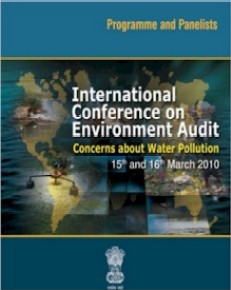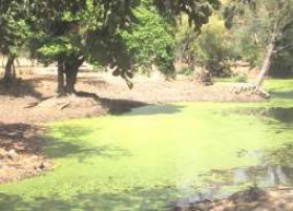Society, Culture, Religion and History
Field experiences by Avinash Krishnamurthy, BIOME Solutions
Posted on 29 Sep, 2010 11:04 AMOne of the oldest "People's electricity" systems I have ever seen (Please read the notes for each of the videos). Of course this trip had even better high points - wine made from Gooseberry and Nutmeg - all locally brewed. So travelling in the midst of hills, sipping local wine, seeing some great work, (and providing perspectives for someone-else to write - is this work or what?
Manual on municipal solid waste management - CPHEEO (MoUD)
Posted on 13 Sep, 2010 02:43 PMThis manual has been developed by the Central Public Health and Environmental Engineering Organisation (CPHEEO), a department under the Ministry of Urban Development and aims at assisting the policy & decision makers, planners, managers and technical personnel involved in solid waste management activities, in safe and hygienic handling & disposal of municipal solid waste generated in the urban areas in India.
7th National Award for Excellence in Water Management 2010 by CII & Godrej
Posted on 13 Sep, 2010 12:38 PMCII – Sohrabji Godrej Green Business Centre is organizing “National Award for Excellence in Water Management”.
The objective of the Award Scheme is to recognize and Award “Excellence” in Water Management in industries and facilitate sharing of information by excellent water efficient companies.
ECO Sanitation - A beneficial toilet
Posted on 13 Sep, 2010 12:27 AMA brochure from Utthan about Eco-sanitation produced with support from Arghyam.
International conference on environment audit - Concerns about water pollution - CAG (2010)
Posted on 10 Sep, 2010 05:15 PM This link on the CAG website provides the details of an international conference that was held on 15-16 March 2010, in the backdrop of the environmental audit proposed by the the Comptroller and Auditor General (CAG) of India, for management and conservation of the environment .
This link on the CAG website provides the details of an international conference that was held on 15-16 March 2010, in the backdrop of the environmental audit proposed by the the Comptroller and Auditor General (CAG) of India, for management and conservation of the environment .
The purpose of this conference was to deliberate on the causes of pollution, action taken by governments and civil society to address this and environmental, management and legal interventions needed to put lakes, rivers and ground water on the path of sustainability.
More than 20 experts on water and water pollution issues were invited to share their views as panelists during the conference. Apart from these distinguished panelists, the heads of supreme audit institutions from countries like Austria, Maldives, Bangladesh and Bhutan were also present to share their experiences regarding audit of water pollution in their countries.
Whitley Awards 2011
Posted on 01 Sep, 2010 04:40 PMContent & Image Courtesy: Whitley Fund for Nature
The Whitley Fund for Nature (WFN) is a UK registered charity offering "Whitley Awards" to outstanding nature conservation leaders around the world. Whitley Awards are both an international profile prize and a form of project grant (currently £30,000 over one year, with a top prize of £60,000 over two years). Whitley Awards were developed to recognize effective leaders and communicators from around the world who are applying sustained, effective efforts to conserve the natural
environment. Conservation needs success stories and champions, and the Whitley Award winner network is a celebration of success taking place all over the world. WFN supports conservationists who already have proven results behind them and are ready to scale up their success and activities.
Sanitation models in Trichy, Tamil Nadu
Posted on 01 Sep, 2010 04:19 PMA few weeks back I had the opportunity to visit a couple of partners in Tamil Nadu. These two partners are facing a difficult task—sanitation and hygiene implementation through community participation. One project is in the urban slums of Trichy while the other one is a rural project a few hours outside of Trichy. These communities have open defecation rates of 90%. The problem mostly lies on the women. Women feel embarrassed and ashamed to go out in the open, so as a result they only go in the early mornings or late at night—basically during pitch black. Menstrual Health is a topic that is only now being addressed with organizations developing their own branch of sanitary napkin production, sold cheaply to women in rural areas. In addition to the burden on women, open defecation pollutes water sources, thereby leading to diarrhea, one of the biggest killers of children in the developing world.
Restoration of traditional small water bodies in Braj - The South Asian Journal of Tourism and Heritage
Posted on 01 Sep, 2010 02:28 PM This paper published in the South Asian Journal of Tourism and Heritage begins by highlighting the importance of the traditional small water bodies in Braj, commonly known as kunds, as important freshwater sources as well as an important part of the culture and the traditions of the area.
This paper published in the South Asian Journal of Tourism and Heritage begins by highlighting the importance of the traditional small water bodies in Braj, commonly known as kunds, as important freshwater sources as well as an important part of the culture and the traditions of the area.
There were 1000 such kunds, which used to be the source of fresh water in Braj in earlier times. The water was used for multiple purposes like irrigated agriculture, domestic uses, drinking water for cattle, bathing etc. Due to rapid urbanisation, lack of maintenance and prolonged negligence in the last 50-100 years, most of the kunds today have become silted up and are nearing extinction.
The impending crisis for fresh water has forced the planners and policy makers to take cognizance of these traditional water bodies and an urgent need has been identified for taking necessary measures to restore the kunds. The present study thus aims at understanding the reasons for deterioration of the kunds and makes some technical suggestions for revival of these kunds.
Babhli water conflict: Less water, more politics - EPW article
Posted on 01 Sep, 2010 02:13 PMThis paper published in the Economic and Political Weekly highlights the recently growing conflicts over water sharing between states in India and argues that the intensity and periodicity of these conflicts are increasing and that these conflicts are expected to get worse with the increasing uncertainty of rainfall and water availability. The document goes on to describe the latest one in the news, the conflict between Maharashtra and Andhra Pradesh over the Babhli barrage.





